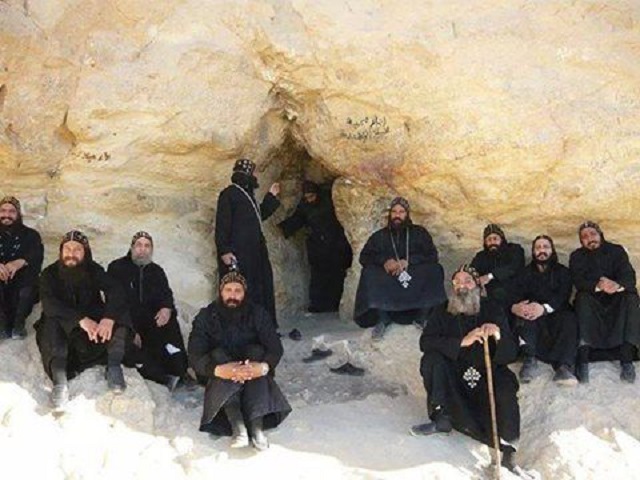“Acquire a peaceful spirit, and around you thousands will be saved.” Saint Seraphim of Sarov Visitors to our monastery, usually from non-orthodox background, sometimes have a burning question to ask. “Why monasticism? isn’t better if the monks use their energy to go out and make disciples of all nations (Mat 28:19)?”,”The monastic life is just …
“Acquire a peaceful spirit, and around you thousands will be saved.”
Saint Seraphim of Sarov
Visitors to our monastery, usually from non-orthodox background, sometimes have a burning question to ask. “Why monasticism? isn’t better if the monks use their energy to go out and make disciples of all nations (Mat 28:19)?”,”The monastic life is just a cop out from real life in the world”, ”monks go to monasteries to laze around and get out of work?” Once a non-orthodox visitor came with his Orthodox friend who brought him for a retreat, and after spending some time with the monks and learning that they mostly had University degrees and had good jobs prior to coming to the monastery, told his Orthodox friend this flattering remark, “these monks can actually make it out there”
While these comments are usually said with great love yet they show a lot of ignorance of the Bible and its commandments. The monastic life from its inception was a life according to the commandments of the Gospels. St Anthony the first monk went out to the desert following the Gospel commandment “If you want to be perfect, go, sell what you have and give to the poor, and you will have treasure in heaven; and come, follow Me.”(Mat 19:21),therefore the monastic life is a life of perfection.
The monastic life by its mere existence is the greatest witness to the Christian life. Mission work is usually associated with going out and building hospitals, schools, and churches, which are all great works of the missionaries, yet a prerequisite to all this missionary work are knees bowed down in prayer for the service and the spread of the Word of God. In the story of Mary and Martha, Jesus praised not the “active life” but the prayer life; ”Mary has chosen that good part, which will not be taken away from her.”(Luke 10:42).This pure and inner prayer life is more than enough for mission and evangelism. In fact in our Orthodox tradition, monks are considered to be the number one evangelists.
In the life of St Mary we never hear of any “active service” of preaching or any kind of philanthropic work, yet in our Praise to her we say: “you have brought, unto God your Son, many people, through your purity” (Sunday Theotokia). It was not her words of wisdom or her active service that brought people to Christ but it was her purity.
In a sermon by Bishop Raphael, he once said that the servants were once trying very hard to bring one of the youth who lived two blocks away from church to attend the liturgy, but without any success. One day this young man went to St Anthony monastery in a church-organised trip, and to the servants surprise the young man after hearing the life of the saint during the bus trip, he eagerly went all the way up the steep mountain that leads to the cave of St Anthony, which took at least 40 minutes of uphill walking on the hot desert sand. The servants were amazed at how despite their sincere efforts to bring this young man to church, they were not as effective as the life of this great evangelist who lived alone in the desert away from any kind of civilization, and as it seems to us, he refused to “actively” serve others, yet his virtuous way of life has been a magnet to all who have heard of him for the last 1700 years.
Therefore to say that monasticism is not important to the church and Christian living, is to say that prayer life is not important, because monasticism is a life of prayer. If we think that building hospitals and homes for the poor are the aim of a Christian life then we certainly are not attuned to the meaning of the Christian life, but we have made the church into a mere humanist organisation. That is not to say that these activities are wrong, after all the first hospital started in a monastery. Monasteries for many centuries have also become a center of learning (i.e. Universities). The same emphasis on the contemplative or “inactive” life not in the monastery but in the life of service in the world is embodied in the life of a contemporary saint, Pope Kyrillos VI, who’s answer to many of the church problems was not according to some strategic administrative skills, but it was simply “it is better not to speak but rather to pray.” This does not in any sense undermine the great achievements of this great patriarch. One only needs to read recent history (rather than his numerous miracle books) to realize the revival that the church went through during his time. Pope Kyrillos’s attitude echoes St Gregory Nazianzus’s (who was also a Patriarch) answer to St Basil expressing his great regard of contemplative life, saying: “for me the greatest action is inaction… so proud am I of my inactivity that I think I might even be a standard for all of magnanimity in this regard.”
The Other argument is that monks are egoistically escaping the “real world” and are not contributing to the society they live in. Such accusations have no solid ground. Monks do not leave the world to escape the world but they leave the world for the world. This is very clear in the life of St Paul the first hermit who lived for 70 years in the desert without seeing a man. St Jerome records that when St Anthony visited him, his first questions to St Anthony where “Tell me, I pray you, how is the human race? Are new houses rising in the ancient cities? By what emperor is the world governed? Whether there are any left who are led captive by the deceits of the devil (idol worshipers)?” These questions are not of someone who hates the world and not contributing to it but it is of someone whose subject of prayer during these 70 years is the prosperity of the world. St Anthony himself when needed he went down to Alexandria to support St Athanasius in his fight against the Arian heresy.
Monasticism, therefore, is a way of first and foremost saving once self for the world. When one is successful in working out his own salvation, St Seraphim of Sarov tells us, thousands around him will be saved.
Join Us: Sign Up Today!
Tags:










